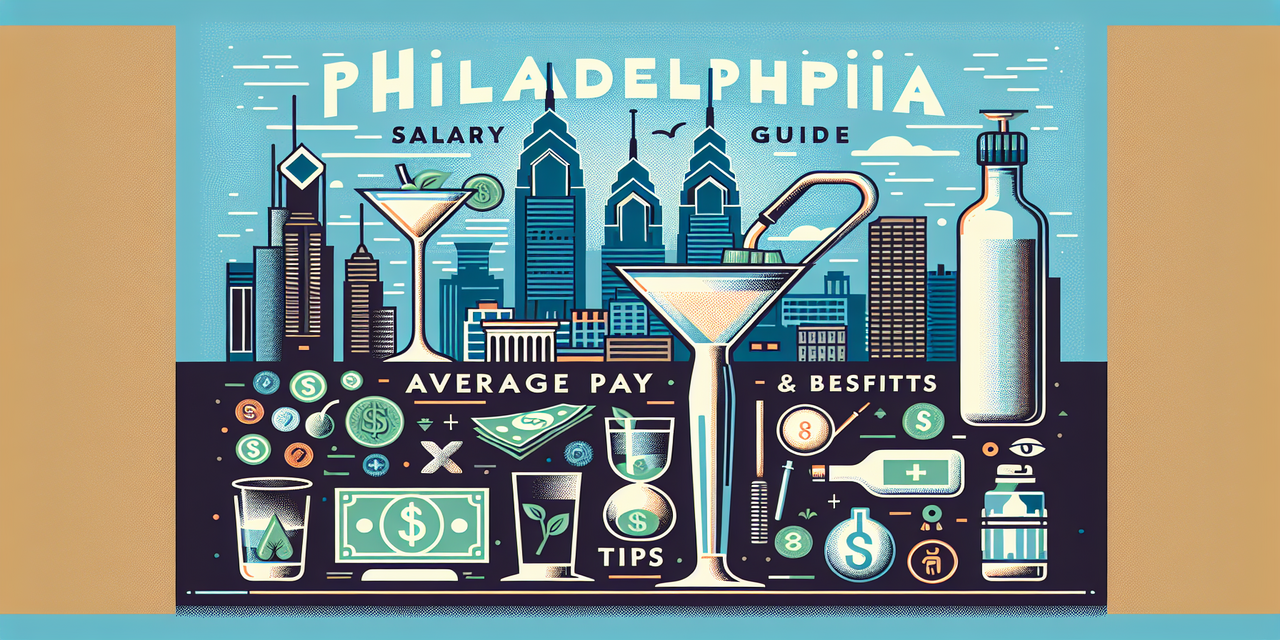Philadelphia Salary Guide for Bartender: Key Takeaways
- Bartenders in Philadelphia earn an average base wage of $14.06 per hour, about 21% below the national average.
- Average daily tips around $150 substantially increase overall bartender earnings in the city.
- Cost of living in Philadelphia is roughly 4% higher than the national average, influencing take-home pay value.
Explore the comprehensive Philadelphia salary guide for bartenders, including base pay, tipping trends, benefits, and cost of living factors.
Gain insight into earning potential at various venues and what you should consider when working in Philadelphia’s bartending scene.
For employers, understanding these dynamics is crucial for effective staffing and retention. Check out how to hire a bartender that customers love for hiring tips.
1. Average Base Pay and Annual Salary for Philadelphia Bartenders
Philadelphia bartenders earn a base hourly wage averaging approximately $14.06. This is notably about 21% lower than the national average for bartenders, reflecting regional wage trends.
When translated into annual figures, this hourly rate corresponds to salaries ranging from $22,228 to $28,650, with the midpoint close to $25,169 per year. These figures represent base pay before tips are factored in.
For more detailed compensation insights, see our bartender salary overview.
Salary Variations by Establishment
Pay rates vary depending on the type of venue. For example, bartenders at nationally recognized chains like T.G.I. Fridays in Philadelphia earn an average of about $22.14 per hour. Similarly, those working at upscale places such as Four Seasons make around $21.54 per hour.
High-end bars like The Franklin Bar and The Ranstead Room often offer higher tipping opportunities, which can significantly boost total earnings, even if base pay remains similar.
Employers interested in optimizing pay structures may find helpful tips at restaurant staff hiring strategies.
2. Role of Tips in Philadelphia Bartenders' Earnings
Tips play a crucial role in bartender compensation in Philadelphia. While the base wage may be below the national average, bartenders report average daily tips around $150.
This amount considerably supplements base wages, making tips a vital component of total income. Structured tipping and customer volume at upscale venues can further increase these earnings.
To understand and optimize tipping culture, employers can review our insights on tipping culture and strategies.
Typical Tip Earnings at Upscale Venues
Bartenders at upscale establishments usually experience higher tip earnings due to clientele with greater disposable income. These tips often reflect premium drink pricing and exceptional service, enhancing compensation beyond standard levels.
3. Philadelphia Cost of Living Impact on Bartenders
Philadelphia's cost of living is approximately 4% above the national average, influencing how far a bartender's earnings will go in the city. These elevated expenses affect housing, utilities, groceries, and transportation.
Housing costs are about 1% higher than average, with median home prices near $523,632 and typical monthly rents around $1,573. Utilities cost about 7% more, averaging $220.88 per month, while transportation expenses, including gas, are approximately 5% higher.
This higher living cost means that despite base wages and tips, bartenders should budget carefully to maintain comfortable living standards.
Employers should consider these factors when setting compensation packages. Learn more about average salaries in Philadelphia and how cost of living impacts them.
4. Benefits and Perks for Bartenders in Philadelphia
Beyond wages and tips, many Philadelphia employers offer a variety of benefits to bartenders, which enhance job satisfaction and financial security.
Common benefits include health insurance coverage, paid time off, opportunities for professional training, employee discounts, and performance bonuses. Some establishments may also provide uniform allowances and retirement plans like 401(k)s.
These perks contribute positively to overall compensation and can be an important consideration when choosing an employer.
Employers aiming to attract and retain bartenders should check out our perks in restaurant job postings for guidance on competitive benefits.
5. Tips for Bartenders to Maximize Earnings in Philadelphia
Bartenders looking to maximize earnings should consider venue type, location, and clientele. Working at upscale or high-traffic bars often yields higher tips.
Additionally, cultivating excellent customer service skills and product knowledge can increase tipping potential. Engaging regular customers and offering personalized service often results in higher gratuities.
Participating in training programs and seeking opportunities for advancement can also lead to better pay and benefits.
To enhance skills and income, bartenders might explore mixologist interview questions to expand their expertise in drink crafting.
6. Useful Resources for Philadelphia Bartenders
For bartenders interested in labor laws, wages, and benefits, the following resources offer authoritative information:
- U.S. Department of Labor: Fair Labor Standards Act (FLSA) – Understand minimum wage and tip credit provisions.
- Pennsylvania Department of Labor and Industry – State-specific labor regulations and workforce services.
- City of Philadelphia Official Website – Local ordinances and employment resources.
Philadelphia Bartender Salary Guide: Conclusion
While Philadelphia bartenders earn base wages below the national average, significant tips and employer benefits help increase overall compensation. The city's higher cost of living is a key factor to consider when evaluating real earnings.
Choosing the right venue, honing customer service skills, and understanding available benefits are essential steps for bartenders aiming to maximize their income in Philadelphia's vibrant hospitality industry.
Restaurant owners can improve staff retention by following best practices found in strategies to reduce restaurant employee turnover.

.png)

.png)
.jpg)